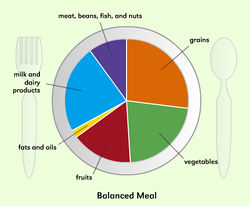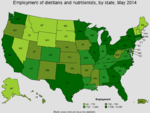Nutritionist
A Nutritionist an expert in everything having to do with food and nutrition. The make plans for people and give suggestions on what they should eat in order to obtain a healthy lifestyle. A nutritionist will assess a patient's needs and make them a plan based on improving their lifestyle. This could be for a school, or a hospital, or even a nursing home. Many nutritionists are even self-employed. Some nutritionists will speak to groups on a lifestyle plan. Overall, their job is to encourage and motivate people to make healthy life changes. Most nutritionists will have a bachelor's degree and a license depending on the requirements for the particular state they live in. On average a nutritionist will make around $55,000 a year. The job rate is expected to grow faster than most other jobs.
What they do
There are a few different kinds of nutritionists and what they do depends on exactly what field they are in. The main thing that they all have in common is that they study the body and food. Their center goal is to evaluate their patients and give them advice on how to live a healthier life. Overall, improving their patients health. Sometimes they will create a diet plan for a specific patient and check in to make sure they are following it. Some will speak at conferences and different groups about how to live a healthier life. Other nutritionist are more interested in writing reports and studying new information that comes out in the industry on dieting fads. It is important for a nutritionist to be up to date on the most recent research.
What you do as a nutritionist really depends on your specialty. A few of the most common types of nutritionist are: clinical nutritionists, community nutritionists, and management nutritionists. A clinical nutritionist will typically work in hospitals and nursing homes. Here they will make plans for patients and help them create a diet around their health needs. Sometimes they will further specialize, for example, working with diabetic patients, or with people with stomach issues. A community nutritionist will normally work for an organization promoting products or speaking at conferences on their knowledge. Their job is to speak to the general public about all things health and nutrition, of course depending on the specific company they work for. A management nutritionist will work for a cafeteria at a school or business and plan the food that will be served making sure that it is up to health codes. These are just a few types of different jobs that a nutritionist can have and what they do [1]
Work Environment/Job Outlook
A nutritionist will work anywhere from a hospital to a school to even nursing homes, some will open their own practice and have clients that they work with on a day to day basis. They typically work full time, but if they open their own practice they can have a more flexible schedule. Depending on where they work, will depend on what their work atmosphere looks like. If they work at a hospital it might be a more high stress with more life or death situations than working at a school cafeteria. At a hospital the nutritionist will probably be in an office meeting with people talking to them and making plans for them based on their needs. At a school cafeteria, the nutritionist will probably be on their feet more. They will be out buying the food and in some cases making it. In a nursing home, for example, a nutritionist will probably go from room to room checking in on patients and making sure they are eating correctly. A nutritionist's job will consist of a lot of planning and organizing. They will also have to be good at communicating with people, because that is a huge part of their job [2]
The job outlook is growing in America, this has a lot to do with the rising obesity rate. This is also because of an increased interest in eating well, and living a healthy lifestyle. A Licensed Nutritionist will make an average annually of $56,000. This also wavers a lot because of the many different types of nutritionists. There are so many different kinds of nutritionists that if a person is interested in health and fitness they can really tailor the rest of the job to fit what they want to do [3]
How to become one
Becoming a nutritionist truly depends on where you live and what you want to specialize in. The majority of nutritionists have a bachelor's degree in something health related and in many states they need to be licensed. There are many different bachelor's degrees that one can get. As long as the degree is food and health related, it is enough to progress to get your license. Many of the courses will include; anatomy, chemistry, psychology, nutrition, or biology. A bachelor's degree on average takes four years, and sometimes will include an internship of some sort. Typically an internship will require a certain amount of hours. Sometimes this happens during school, but often it is right after you graduate. A person can move on to get their masters or a doctorate, it just depends on how far they want to go. A masters requires an extra two years of schooling [4]
The majority of states require nutritionists to have a license. Requirements to get your license depends on the state that you live in. In most states you are required to have a bachelor's degree, an internship, and to pass an exam. Many jobs require their employees to be a Registered Dietitian Nutritionist. There are many different licenses and certificates depending on the person's specialization [5]
Salary/Benefits
In any job the amount a person makes truly depends on where they work and how often. In 2012 the average wage of a nutritionist was around $55,000 a year. The lowest ten percent made about $34,000 while the highest ten percent made approximately $77,000. The average nutritionist makes slightly less than $30 an hour. With a Registered Dietitian Nutritionist certificate, a person can make about $5000 more a year. Nutritionists make slightly less than the average nurse, but they make more than any nursing assistants and most rehab councilors.
Most nutritionists work full time. If someone is self employed, they obviously have more flexibility in when they work and how much they make. Nutritionists who live in more liberal areas tend to make more money, because their careers are more valued in those areas [6]
Video
How to become a nutritionist
References
- ↑ What-does-a-nutritionist-do? Sokanu. Web. 5 May 2015 Date Accessed.
- ↑ Nutritionist-Career-Overview Nutrition ED. Web. 5 May 2015 Date Accessed.
- ↑ Dietitians-and-Nutritionists-Job-Outlook Bureau of Labor Statistics. Web. 8 January 2014 Date Published.
- ↑ How-to-become-a-nutritionist Learn how to become. Web. 19 May 2015 date accessed.
- ↑ How-to-become-a-dietitian-or-nutritionist Bureau of Labor Statistics. Web. 19 May 2015 date accessed.
- ↑ Pay Bureau of Labor Statistics. Web. 8 January 2014 last updated.
| ||||||||||||||||||||



